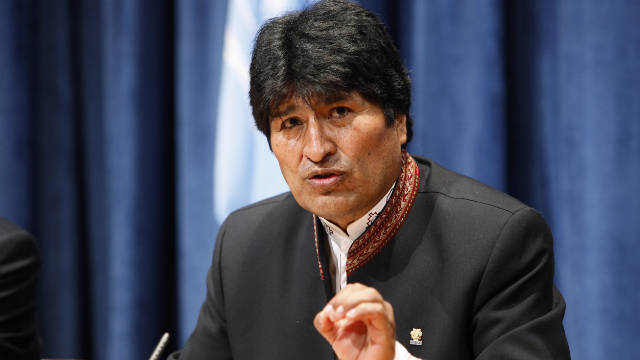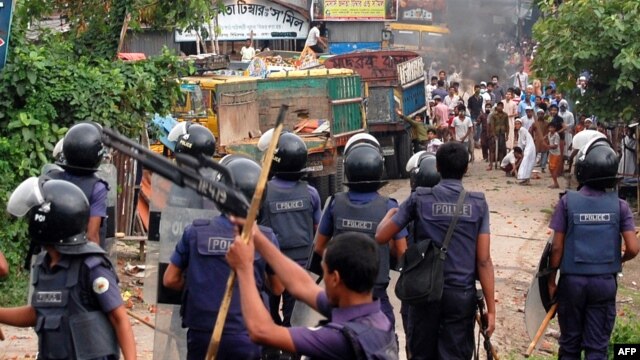Thousands of Malaysians Protest Over Allegedly Fraudulent Elections
By Irving Feng
Impunity Watch Reporter, Asia
KUALA LUMPUR, Malaysia – The Rakyat, Malaysia’s three party opposition alliance to the allegedly corrupt central government, held a protest rally to shun a possible election fraud that may have been present in Malaysia’s May 5th national elections.

Anwar Ibrahim, leader of the opposition alliance, vowed to expose the central government’s actions that fraudulently allowed the Barisan Nasional coalition to stay in power. The opposition alliance bases their allegations on the fact that the Barisan party only won 46% of the popular vote during the national election, however, they still own a majority of the parliamentary seats.
Anwar Ibrahim’s opposition alliance only managed to secure 89 parliamentary seats despite securing a majority of the popular vote (at 51%). The Barisan managed to hold onto 133 seats. Investigators have alluded to possible voting irregularities and are now focusing their efforts around 30 seats where the margin of victory was extremely small and perhaps the integrity of the votes was questionable.
Growing concerns over voting integrity and the possibility that the central ruling party has implemented some type of illegal tactic in the recent election triggered a massive number of mass protests in the streets in addition to Anwar Ibrahim’s large stadium demonstration.
Malaysia’s electoral system has been under scrutiny by the public in recent years and the civil society group, Bersih, has pushed for electoral improvements. The proposed improvements, however, were struck down after being put to a vote and the central government’s elections commission only adopted a small portion of the broad number of proposed changes.
Third party think tanks including Democracy and Economic Affairs (IDEAS) and the Centre for Public Policy Studies (CPPS) had dispatched observers to the Malaysian election scene in order to gather information and verify the legitimacy of their voting practices.
The report compiled by the third party observers noted that mainstream media is dominated by the Barisan ruling party and the content is heavily biased in favor of the current central government. Furthermore, central government and military facilities are commonly used in campaign efforts by the Barisan.
The third party observers further reported that the lack of transparency in political and electoral financing further exacerbates the problems with allegations of voting fraud. The irregularities in the May 5th election will have a significant impact on the legitimacy of the ruling party going forward.
The current prime minister’s office has rejected the allegations and accusations of voting fraud because they believe that the evidence brought forward by the third party observations are unsubstantiated. However, concerns over voting fraud were already in the winds with reports that thousands of constituents were flown in from Borneo to Kuala Lumpur to rig the vote.
For further information, please see:
Al Jazeera – Opposition protests Malaysia vote ‘fraud’ – 9 May 2013
The Wall Street Journal – Malaysian Premier Tested by Protests Over Vote – 9 May 2013
Reuters – Malaysian rally to protest election “fraud” draws big crowd – 8 May 2013
BBC – Malaysia’s Anwar Ibrahim urges protest over poll defeat – 6 May 2013
Chilean Student Protests Ends With Petrol Bombs Thrown At Police
By Brendan Oliver Bergh
Impunity Watch Reporter, South America
SANTIAGO, Chile – Thousands of students took to the streets today as protestors marched on the Chilean capital of Santiago demanded free education. The second national march of the year, protestors clashed with police despite the peaceful undertone as petrol bombs were met with tear gas and water cannons.

While Chile’s education system is regard highly among Latin American countries, protestors state that they are discriminatory and unfair. While the middle and upper class have access to top schooling, the poor are limited to under-funded state schools with no free universities available.
The movement began with numerous demonstrations in 2011, and shows no signs of letting up. Few have seen any new benefit in the past few years, but education reform is slated to be a large issue during this year’s November Presidential election. Nationwide students marched for the opportunity to the same access to the education systems that the rich of the nation have had for generations. While the movement is mainly peaceful, with students waving signs and chanting, nefarious elements turned parts of the march violent.
Whether or not the protesters themselves have become violent or small groups of ill-tempered individuals who have infiltrated the movement has become the main question for police officers. Throughout Latin America during seemingly peaceful protests, hooded vandals can be seen inciting police officers to take the bait by throwing stones, vandalize shops and throwing homemade incendiary devices. Their intentions however must be questioned, as once peaceful scuffles become increasingly dangerous and disruptive as riot police shut down the protests. Here in Santiago after petrol bombs were thrown, the once peaceful protest was forcibly shut down by police who were attempting to quell the riot favoring elements.
Last month, 100,000 students marched for free education. The protest left casualties as eight officers were injured, one in serious condition after being attacked with acid, with 109 protestors were detained for different offenses.
For more information please see:
BBC – Chile Students Resume Protests For Free Education – 8 May 2013
Edmonton Journal – Chile Students Stage Big Protest Demand Education Reform – 8 May 2013
BBC – Chile Student Protests Resume As 100,000 March – 11 April 2013
Bolivian President Uses New Constitution To Seek Unprecedented Third Term
By Brendan Oliver Bergh
Impunity Watch Reporter, South America
SUCRE, Bolivia – A packed judiciary made their decision this week, despite constitutional restrictions, President Evo Morales would be able to seek a third term as President of Boliva.

Following other Latin American leaders on the right and left, the Bolivian supreme court announced that despite term limits set forth by the Bolivian constitution, President Morales would be eligible to seek a third 5 year term after his current term expires. The language of the constitution allows that a Presidential candidate may only seek re-election once. However Supreme Court ruled that despite this being Morales second attempt at re-election, his first would not count as this was a new ratified constitution, that differed from the ones that were in place when Morales sought his initial term, and its subsequent re-election. Indicating that next year’s vote will be legally counted as Morales’ first re-election.
Opponents are claiming foul play are in order. The new constituoon was ratified via referendum in 2009, which lead many at the time to question whether Morales would attempt to circumvent the resitrictions. Insiders say that the constitution was only ratified because of a promise that Morales would not attempt to run for a third term. As for the court decision, opposition leader Samuel Doria Medina of the National Unity party accused the Morales government of stacking the judiciary in a way that favored Morales’ policies.
After the Constitutional Courts statement, the Senate of Bolivia immediately passed the Law Enforcement Legislation which would allow Evo Morales on the bill for the December 2014 Presidential election. The bill was passed quite quickly and is likely to be ratified by the parliamentary majority supporting Morales.
Should Morales win, he will be the longest sitting President in Andean politics, and be the longest sitting ruler in Bolivian history
For more information, please see:
La Republica – Evo Morales: Senate Approves Bill Allowing third Candidacy – 7 May 2013
Financial Times – Boliva court Clears Evo Morales’ bid To Run For Third Term – 30 April 2013
CNN – Court Clears Path For Bolivia’s Morales to Run For 3rd Term – 30 April 2013
Reuters – Court Allows Bolivia’s Morales To Seek Second Re-Election – 29 April 2013
20 Die in Bangladesh After Violence Clashes Between Muslim Protesters and Police
By Irving Feng
Impunity Watch Reporter, Asia
DHAKA, Bangladesh – At least 20 Bangladeshi deaths have resulted from a series of violent clashes between Muslim protestors attempting to push for religious reforms and state riot police attempting to quiet the discontent in the streets.

On Sunday, 200,000 Muslims and proponents of Islamic religious change marched in the capital city of Dhaka. The demonstrators were met by state police forces that fired rubber bullets and tear gas into the crowd in an attempt to disperse the mobs.
The demonstrators regrouped the next day, on Monday, and retaliated against the police attacks by hurling stones at city officials. The police again utilized teargas and rubber bullets, as well as water cannons, to try and stop the violence.
The protestors also damaged private and public property during their violent demonstrations by setting fire to vehicles, including at least two police vehicles, and attempted to overrun a police outpost near the edge of the city.
Additional violent clashes erupted in the city of Chittagong in the southeastern portion of the country. Police opened fire with live ammunition rounds at the protestors attempting to overrun their position. Another two protestors were killed in the southern city of Bagerhat.
The violence is a result of political actions perpetrated by the Islamist group “Hefajat-e-Islam” which has urged the government to adopt a new blasphemy law, reinstate a pledge to Allah in their national constitution, adopt a new law that bans women from freely associating with men, and making Islamic education mandatory in schools.
The central government of Bangladesh has resisted the demands of the Islamist group and refuses to make the changes. U.N. Secretary General, Ban Ki-moon has urged the Muslims seeking religious reform in the country to go about their business peacefully and for the central government to respond in kind.
The country has seen a string of violent protests emerge since January of this year. An investigative tribunal was set up in order to probe abuses that were perpetrated by possible war criminals during the 1971 war for independence from neighboring Pakistan. A main Muslim party leader of Jamaat-e-Islami was sentenced to death by the investigative tribunal after the proceedings.
The central party leaders of the Jamaat had been accused of committing the crimes of rape, murder and torture during the war for independence. Jamaat-e-Islami was also a large opponent to the current central government’s push for independence.
Hefajat-e-Islam emerged in the aftermath of the controversial tribunals that condemned the Jamaat-e-Islami party leaders and the new party has also revived the push for strong Islamic, religious reforms that Jamaat once stood for.
For further information, please see:
Irish Independent – Bangladesh rallies leave 20 dead – 6 May 2013
Reuters – At least 20 dead in Islamist protests in Bangladesh – 6 May 2013
Xinhua World News – Bangladesh closes pro-opposition TV channels after 20 killed in police, Islamists clashes – 6 May 2013
Voice of America – 20 Killed in Clashes Between Bangladesh Police, Islamists – 5 May 2013